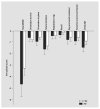MMSE scores decline at a greater rate in frontotemporal degeneration than in AD
- PMID: 16899996
- PMCID: PMC1592245
- DOI: 10.1159/000094870
MMSE scores decline at a greater rate in frontotemporal degeneration than in AD
Abstract
The clinical diagnostic criteria for frontotemporal degeneration (FTD) include relative preservation of memory and visuospatial function, in contradistinction to characteristics of Alzheimer's disease (AD). The Mini-Mental State Examination (MMSE) contains items to assess these areas of cognition. In a retrospective case-control study of participants at two institutionally-based AD centers, we determined whether total MMSE and MMSE subscores would reflect the disease progression projected by the clinical criteria of FTD vs. AD. Participants were 44 subjects with FTD (7 pathologically confirmed) and 45 with pathologically confirmed AD. Each subject had at least two MMSEs with minimum inter-test intervals of 9 months. We compared annualized rates of change for total MMSE scores and cognitive domain subscores over time and between groups by two independent samples t-tests and proportion tests. The total MMSE score (p = 0.03) and language subscore (p = 0.02) showed a greater rate of decline for the FTD group than the AD group, although the constructional praxis item declined less rapidly in the FTD group (p = 0.018). Changes in MMSE subscores paralleled the clinical diagnostic criteria for FTD. The more rapid progression on the language subscore was observed in both language and behavioral variants of FTD.
Copyright (c) 2006 S. Karger AG, Basel
Figures
Similar articles
-
Rate of progression differs in frontotemporal dementia and Alzheimer disease.Neurology. 2005 Aug 9;65(3):397-403. doi: 10.1212/01.wnl.0000171343.43314.6e. Neurology. 2005. PMID: 16087904
-
Mini-Mental State Examination subscores indicate visuomotor deficits in Alzheimer's disease patients: A cross-sectional study in a Dutch population.Geriatr Gerontol Int. 2014 Oct;14(4):880-5. doi: 10.1111/ggi.12183. Epub 2013 Nov 15. Geriatr Gerontol Int. 2014. PMID: 24237759
-
The frontal assessment battery does not differentiate frontotemporal dementia from Alzheimer's disease.Dement Geriatr Cogn Disord. 2006;22(2):125-31. doi: 10.1159/000093665. Epub 2006 May 29. Dement Geriatr Cogn Disord. 2006. PMID: 16733354
-
Neuropsychological deficits in frontotemporal dementia and Alzheimer's disease: a meta-analytic review.J Neurol Neurosurg Psychiatry. 2007 Sep;78(9):917-28. doi: 10.1136/jnnp.2006.100669. Epub 2007 Mar 19. J Neurol Neurosurg Psychiatry. 2007. PMID: 17371908 Free PMC article. Review.
-
The effectiveness of Kami Guibi-tang for cognitive impairment patients: A retrospective chart review.Heliyon. 2023 Dec 15;10(1):e23615. doi: 10.1016/j.heliyon.2023.e23615. eCollection 2024 Jan 15. Heliyon. 2023. PMID: 38187321 Free PMC article. Review.
Cited by
-
The epidemiology of frontotemporal dementia.Int Rev Psychiatry. 2013 Apr;25(2):130-7. doi: 10.3109/09540261.2013.776523. Int Rev Psychiatry. 2013. PMID: 23611343 Free PMC article. Review.
-
The mini-mental state examination in behavioral variant frontotemporal dementia and primary progressive aphasia.Am J Alzheimers Dis Other Demen. 2007 Dec-2008 Jan;22(6):468-73. doi: 10.1177/1533317507307173. Am J Alzheimers Dis Other Demen. 2007. PMID: 18166606 Free PMC article.
-
Surface-based morphological patterns associated with neuropsychological performance, symptom severity, and treatment response in Parkinson's disease.Ann Transl Med. 2022 Jul;10(13):741. doi: 10.21037/atm-22-630. Ann Transl Med. 2022. PMID: 35957730 Free PMC article.
-
Montreal Cognitive Assessment vs the Mini-Mental State Examination as a Screening Tool for Patients With Genetic Frontotemporal Dementia.Neurology. 2025 Mar 11;104(5):e213401. doi: 10.1212/WNL.0000000000213401. Epub 2025 Feb 14. Neurology. 2025. PMID: 39951678 Free PMC article.
-
DAPHNE: A New Tool for the Assessment of the Behavioral Variant of Frontotemporal Dementia.Dement Geriatr Cogn Dis Extra. 2015 Dec 18;5(3):503-16. doi: 10.1159/000440859. eCollection 2015 Sep-Dec. Dement Geriatr Cogn Dis Extra. 2015. PMID: 26955383 Free PMC article.
References
-
- Neary D, Snowden JS, Gustafson L, Passant U, Stuss D, Black S, Freedman M, Kertesz A, Robert PH, Albert M, Boone K, Miller BL, Cummings J, Benson DF. Frontotemporal lobar degeneration: a consensus on clinical diagnostic criteria. Neurology. 1998;51:1546–1554. - PubMed
-
- McKhann GM, Albert MS, Grossman M, Miller B, Dickson D, Trojanowski JQ. Clinical and pathological diagnosis of frontotemporal dementia: report of the Work Group on Frontotemporal Dementia and Pick’s Disease. Arch Neurol. 2001;58:1803–1809. - PubMed
-
- Lipton AM, Benavides R, Hynan LS. Disease duration is shorter in frontotemporal dementia than in Alzheimer’s disease. Neurology. 2003;60(suppl 1):A377.
-
- Hodges JR, Davies R, Xuereb J, Kril J, Halliday G. Survival in frontotemporal dementia. Neurology. 2003;61:349–354. - PubMed
Publication types
MeSH terms
Grants and funding
LinkOut - more resources
Full Text Sources
Medical


